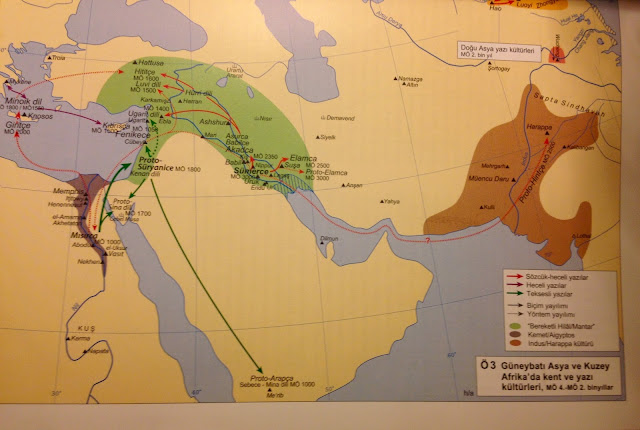Source: Atlas of Philosophy; Spaces and Ways of Thinking,
Elmar Holenstein, Küre Publications, June 2015
ENGLISH/TURKISH
Sumerian Turkish Comparison, Muazzez İlmiye Çığ
Root Language Search, Haluk Berkmen
From Cuneiform to Letters, Haluk Berkmen
Bel, Cybele, Hypatia, Kublai; Haluk Berkmen
Dravidian, Sumerian and Turkish; Haluk Berkmen
From Sumer to Egypt by Haluk Berkmen
ENGLISH
Towards Sumer and Elam, Haluk Berkmen
Hittite and Sumerian, Haluk Berkmen
The Sumerian Language by Haluk Berkmen
A morphological and syntactical study of Sumerian and Turkish
Supervisor: DOÇ . DR. MUSTAFA SARICA ; ASSOC. DR. YUSUF KILIÇ Geographical
Information: Yüzüncü Yıl University / Institute of Social Sciences / Department of Turkish Language and Literature / Department of Turkish Language
Subject: Linguistics = Linguistics ; Ancient Languages and Cultures = Ancient Linguistics and Cultures ; Turkish Language and Literature = Turkish Language and Literature
Index:Dil = Language ; Linguistics = Linguistics ; Sumerian = Sumerian language ; Turkish language = Approved
PhD
Turkish
2014
483 p.Sumerian BC. It is the language of the oldest known writing, dating back to 3500 BC. The first documented written example of Turkish is AD VIII. Orkhon Monuments dated to the middle of the century. This study, in which we compare Sumerian and Turkish in terms of morphological and syntactical aspects, has a diachronic perspective since the two languages were written at different times. such studies focus on the evolution of languages over time. Of these languages that we examined, Turkish is in the Ural-Altaic language family, while Sumerian does not belong to any language family.Although the languages in question do not belong to the same language family, it is known that they are formally related languages. Although lexical comparisons have been made about Sumerian and Turkish in our country, no structural comparison has been made to reveal their morphological and syntactic features. With this study, it is aimed to eliminate the deficiencies in the field. Our study is based on two main sections: morphological features and comparison and syntactic features and comparison.These analyzes were made comparatively by using distributional analysis methods. The data obtained in the two sections were brought together and explained in the evaluation section. According to the results obtained, while the interesting and important common points of the two languages were revealed, it was determined that there were some fundamental differences. These determinations are clearly revealed in the conclusion section.
Sumerian is known the oldest language type from 3500 BC, but the first written examples of Turkish, where have been identified Orkhon Inscriptions, are dated to the middle of the VIII century. In this study which we compares Sumerian and Turkish in morphologic and syntactic aspects has a diachronic point of view, because these two languages have been written at different times. This sort of studies are focused on the evolution of languages in time.
While Sumerian is not a member of any language family, our subject to review of Turkish language is included in Ural-Altaic family. although the both languages are not belonged to the same language family; they are known to be agglutinated languages in stylistically. Although many lexical comparisons for Turkish and Sumerian are made in our country, have not been made any structural comparison to reveal morphologic and syntactic characteristics.
This study aims to correct the deficiencies in this field. This study based on researches of two main sections which are morphological features and comparison, syntactic features and comparison. These researches are performed in using distributional analysis methods in a comparative manner.
The data obtained in two parts is described together at the evaluation part. According to the obtained results, while exposing outstanding and important points in common of two languages, have identified some basic differences. These findings are set out clearly in the results section.






















